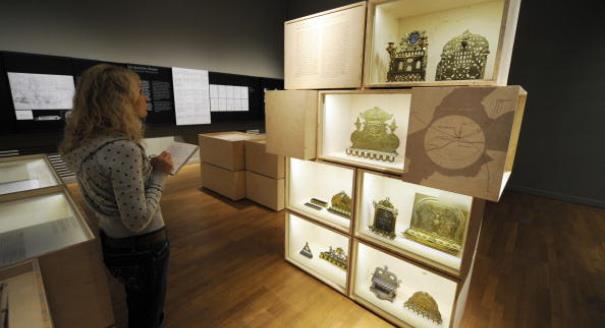When German Chancellor Angela Merkel openly asked Russian President Vladimir Putin to return to Germany the art the Red Army had stolen in 1945, it showed how bad the relations between the two leaders have become.
Merkel and Putin had at first canceled the joint opening of a controversial exhibition of looted German art at a St. Petersburg museum. The Kremlin said there was not enough time for Merkel to give her remarks. The chancellor was prepared to stay away. Sensing this diplomatic faux pas, Putin changed his mind. The two leaders would be speaking after all.
Ever since Putin became president again two years ago, Merkel has not shied away from criticizing his clampdown on nongovernmental organizations and his treatment of opposition movements.
Even more telling is the way in which her governing Christian Democratic Union party has adopted a much harsher tone toward the Kremlin. It is a signal, at least on the part of the Christian Democrats, that the German strategy of Ostpolitik based on quiet engagement with the Kremlin has run its course.
This has immense implications for Europe’s strategy toward Russia. For decades, the EU’s approach was influenced by Berlin’s belief that tighter economic and political ties with Russia would increase the chances of modernizing Russia’s economy and political system.
The Chancellery no longer subscribes to that belief—even if German industry doggedly tries to pursue that policy, regardless of Putin’s authoritarian style and his unwillingness to diversify the economy. Because of this shift by Merkel, she was prepared to speak out about wanting Russia to return the looted art.
At the end of World War II, when Stalin’s Red Army entered Berlin, it raided the museums and galleries along the way. Over 2.5 million items were sent back to the Soviet Union. In a gesture of friendship with Communist East Germany, the Kremlin returned some of the stolen art to its Communist allies in 1958. The rest remained in storage.
Now, for the first time since 1945, the Hermitage museum in St. Petersburg has opened an exhibition of plundered artifacts. Called “Bronze Age: Europe Without Borders,” it has on show 600 items that were taken from Germany to Russia after 1945. Despite repeated attempts by Berlin to get the art back, Russia considers the items state property and not subject to international law.
Besides, leading Russian museum directors believe the booty is legitimate compensation for Soviet works of art that had been looted or destroyed by the Nazis.
“It is our opinion that these exhibition pieces should be returned to Germany,” Merkel said during the opening ceremony. Putin replied: “We probably should not start a discussion now because people will appear on the Russian side who would evaluate the damage done to our art during World War II.”
Of course, Merkel was doing some electioneering as well.
With less than three months to go before the next federal election, she has been much more critical of Putin. However, Merkel has yet to formulate what kind of long-term strategy Germany—and, by implication, the EU—needs toward Russia.
Looted art is just one issue that dogs the relationship between Berlin and Moscow. It is a highly sensitive and political topic because it is one of the last chapters of World War II that is still open. When it is made a public issue, as in the spat between Merkel and Putin, it shows how this past haunts many countries across Europe.
The cultural damage wrought by the Nazis between 1933 and 1945 was immense. Paintings, drawings, silver, books, and manuscripts were either stolen or destroyed. Under pressure, many Jewish families who were desperate to flee and needed the money to do so sold works well below their value.
The Nazis, too, raided museums as the Wehrmacht invaded Poland and Czechoslovakia and other countries to the east. Some of these countries are still negotiating with German museums to return art plundered during World War II.
And some of these countries have also stolen art once owned by Jews. To this day, the national museum in Budapest, for example, houses pictures that the Commission on Looted Art in Europe claims is not rightfully theirs.
Very slowly, museums on both sides of the Atlantic that work closely with commission are examining their collections to establish if they were obtained in good faith.
Many museum curators, who want to hold on to paintings and other works of art, continue to resist restituting them. This is not only about wanting to keep such fine works. It is about decency and honor.
Dealing with restitution claims will be a long and difficult process. But it will finally close this ignominious chapter of World War II, something that Russia does not even consider needs addressing. And if Russia under Putin is not prepared to confront this part of its past, how far can Germany and Europe move forward with Moscow?


-2.png)

.png)

.png)